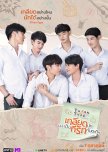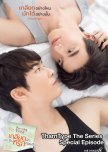
Deze recentie kan spoilers bevatten
Waste of a wacky premise
The huge buzz around this series was what put it on my radar, but it was only when I learned of its wacky premise that I decided to give it a try. The first few episodes were entertaining enough, especially when Green (Gun Korawit), who starts out as the villain, turns out to be slightly more complex than I had expected.Unfortunately, things quickly lose steam once Sarawat (Bright Vachiwarit) and Tine (Win Metawin) begin to confront their real feelings of mutual desire within the framework of their fake relationship. After Green virtually disappears from the story, the narrative tries to raise the stakes by introducing obstacles between Sarawat and Tine, but these obstacles are so lazily conceived and deployed that I found it hard to care.
It doesn't help that Bright and Win, while both very attractive, aren't able to simulate convincing romantic chemistry. At best, they come across as being good enough friends that their sharing the same bed isn't weird. Bright's performance is particularly disappointing because he has already had years of acting experience before landing this role. I understand that the character of Sarawat is supposed to be aloof, but Bright tends to play him as dead-eyed and bored (and, therefore, boring). Despite being a rookie, Win manages to outshine him, especially in the more melodramatic moments.
The plot lines involving the other characters are similarly flawed, but I ended up finding them much more interesting.
This is the first BL series that I've ever watched, and getting through it has made me realize that I need to adjust my standards downward quite a bit. It has a lot of cute, fun moments that indicate where the show might have gone but doesn't. With the exception of the ending, it isn't completely terrible and I understand why people find it entertaining.
Vond je deze recentie nuttig?

TharnType Special: Lhong's Story
4 mensen vonden deze beoordeling nuttig
Deze recentie kan spoilers bevatten
Excusing the unexcusable
This episode, which relies heavily on flashbacks to preceding episodes of 'TharnType: The Series', does not merely attempt to provide context for Lhong's appalling behavior. It is essentially a bid to render Lhong sympathetic, and his horrible misdeeds, excusable.It might be plausible for someone suffering from deep loneliness to over-invest in their bond with the one person who has been kind to them, as Lhong does with Tharn. To move from a less-than-healthy attachment to a good friend to the orchestration of a gang rape, blackmail, relationship sabotage, and attempted murder, however, should be too extreme a pivot to elicit pity. And yet eliciting pity is what this "special" tries to do, especially given how it unfolds toward the ending: Lhong's sister comes to learn of his psychological wounds and, completely unaware of the evils that he has done, asks him to forgive her and embraces him.
Kaownah Kittipat does what he can with the character, but Lhong is utterly beyond defense, and at no point do his victims get justice. Why this episode was made at all is beyond me.
Vond je deze recentie nuttig?

Deze recentie kan spoilers bevatten
An irredeemably toxic drama from the pen of a talent-free hack
As the meme goes, when the makers of 'TharnType: The Series' (TTTS) were asked which problematic tropes they wanted to include, they said, "Yes." This series features, and almost always romanticizes, sexual misconduct, sexual assault, child molestation, gang rape, intrafamilial lust, aggressive homophobia, partner violence, emotional manipulation, stalking, blackmail—you get the picture. As if not content with these horrors, it perpetuates further outrages by trivializing trauma from sexual abuse and conflating homosexuality with pedophilia. No topic is heavy or taboo enough to escape treatment in a frivolous, inane manner.I am well aware that this series was adapted from a web novel, and it certainly bears the imprints of the conventional sort of talent-free hack that haunts self-publishing platforms. If TTTS is any indication, MAME can be safely said to have: an impoverished imagination; little curiosity about, much less empathy for, other people, especially queer people; non-existent literary standards; and an outsize, puerile desire to be as "edgy" and "shocking" as possible. The production team, having been tasked to bring such a terrible, toxic narrative to onscreen life, can hardly be expected to depart radically from the source material.
Amid all these, the sole bright point of TTTS is its cast. When they are not enacting the above-mentioned problematic tropes, the performers do eke out moments of genuine affection and tenderness, whether filial, platonic, or romantic. The chemistry between Mew Suppasit and Gulf Kanawut, who play the titular characters, definitely helped in their love scenes—when these were scenes of actual love, rather than of forced intimacy. Techno (Mild Suttinut), Type's best friend, is hilarious, and the interactions between siblings Tharn, Thorn (Tong Thanayut), and Thanya (Maria Tiprada) are heartwarming. It is unfortunate that these moments are far too occasional, and insufficiently influential on the story, to even begin to redeem the series.
Vond je deze recentie nuttig?

Deze recentie kan spoilers bevatten
An apology letter to viewers of '2gether'
'Still 2gether' is essentially an apology letter to viewers of '2gether', which, not to put too fine a point on it, was a mess. This follow-on series manages to tell a more or less coherent, if somewhat implausible, narrative with plenty of cute, silly, and entertaining moments. I also appreciate the effort that 'Still 2gether' makes to address the storytelling holes that '2gether' failed to close. Overall, this is better than its predecessor, and has enough integrity to stand on its own.Nevertheless, 'Still 2gether' falters on many fronts. Given that Sarawat and Tine are supposed to have been boyfriends for a year by the time the series opens, the two-week separation period that they are constrained to undergo should have been a minor inconvenience. Instead, it is a huge driver of melodrama. Exactly why their relationship isn't healthy or solid enough to withstand temporary apartness isn't explained.
Moreover, while viewers outraged by the ending of 2gether may be gratified that 'Still 2gether' has Sarawat and Tine kiss, the general lack of physical intimacy between these so-called lovers is strange, to say the least. I don't mean that they have to engage in anything explicit—it has more to do with the seeming inability of the lead performers to muster anything remotely resembling romantic chemistry onscreen, which is why I found myself much more interested in the supporting characters. That said, as before, Win Metawin pulls ahead of Bright Vachiwarit in terms of acting.
Finally, on some level, 'Still 2gether' is just a five-episode excuse to peddle various goods: Idolo skincare products, Lactasoy soy milk, Oriental Kitchen noodles, Oishi beverages, and show-related merchandise, such as the Sarawat and Tine dolls and jerseys. I realize that Thai shows normally feature a lot of embedded advertisements, but the product placements here seemed particularly heavy-handed. Perhaps the worst offender is Idolo: Sarawat and Tine use the products that Bright and Win endorse in real life.
Vond je deze recentie nuttig?

Deze recentie kan spoilers bevatten
A glimpse of what 'TharnType: The Series' could have been
My viewing experience of 'TharnType: The Series' (TTTS) very quickly devolved into hate-watching. I will admit, however, that, layered with that hate was a certain fascination with the interactions between Mew Suppasit and Gulf Kanawut. When, in their respective roles as Tharn and Type, they aren't physically or psychologically violating one another—which, sadly, they do throughout TTTS—there is an undeniable chemistry between them, generating both sweetness and heat. This led me to complete TTTS and watch "Our Final Love" (OFL).OFL would collapse without the lead actors' chemistry, as this chemistry is the one thing that helps to hold the episode's disparate parts together. The first third of the episode only exists to indicate that Tharn and Type are entering the fourth year of their relationship, and could have been discarded without consequence. Some of the final moments of OFL are, unforgivably, spent rehabilitating Lhong, who, in TTSS, gets away unscathed despite plotting a gang rape, perpetrating blackmail, engaging in relationship sabotage, and attempting a murder. That he is badly tortured by his conscience is supposed to be enough to redeem him here.
The section that manages to make the most narrative sense, but just barely, is the middle one: a flashback to the time when Tharn accompanies Type home to be introduced to Type's parents, some months after the events of TTTS. This set-up is a romantic-comedy staple, and it plays out in a more or less entertaining, if also largely conventional, way. In the course of dealing with opposition to their relationship from Type's father, Tharn and Type bicker, trade innuendos, cuddle, make out, have sex, and affirm their undying devotion to each other. The story then jumps forward to the present to reveal Tharn and Type waking up from their dream of the meet-the-parents scenario. For some reason, Tharn takes this as an opportunity to cajole Type to don a pair of cat ears and meow for him—bizarre, but charming enough that I can let it slide.
OFL tries to get out from under the decidedly queerphobic, abuse-glorifying shadow of TTTS, by having Type's mother validate her son's romance and Type reconcile with his gay friend Kom, but these come across as feel-good concessions in the name of grudging tolerance rather than wholehearted acceptance. Still, the middle section as a whole does at least hint at how much better TTTS could have been, trimmed of MAME's obnoxious, dangerous attempts to be provocative for its own sake.
Vond je deze recentie nuttig?



